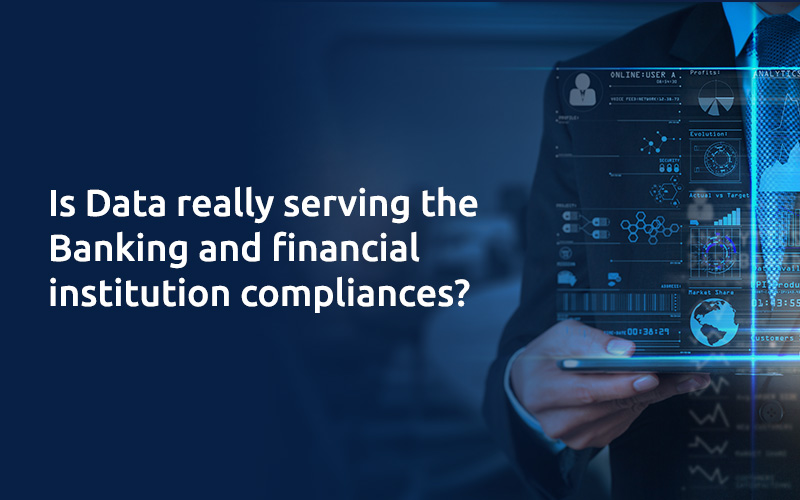
Is Data really serving the Banking and financial institution compliances?
Today, the perspective of the financial and health crises, as well as the issues of money laundering and terrorism financing, are responsible for constant compliance inflation. It requires banks and financial institutions to have a good “compliance” management system in place to manage risks such as money laundering & fraud prevention, proper interaction conduct, personal data protection, tax legislation, and so on.
The compliance teams must constantly discuss the major present and projected regulations and confirm that they are kept up to date.
Furthermore, the risks associated with a reputational downgrade due to a single rule infringements can result in sizable expenses if the company fails to anticipate a regulatory change and appropriately account for it, even without mentioning legal sanctions.
Regulatory constraints on the financial and banking sector
Due to the numerous financial crises that have hit the sector, accountability and integrity are the watchwords when it comes to banking compliance. The financial sector’s supervisory and regulatory authorities have intensified their standards in terms of recurrence and record keeping of information, and they will continue to do so exponential rate.
1.Complete compliance reports
The regulators are now seeking information that they did not demand previously. The bill payment example is particularly revealing because the location of the payment and payee must now be provided. This problem raises anticipation issues because the information provided to regulatory authorities is likely to evolve without the people knowing what information will be requested and taken into consideration.
2.Traceability measures
Regulatory authorities claim enhance traceability of data and values obtained in compliance reports. To ensure this traceability, financial and banking sector people involved must take the necessary steps to inform the regulator of the origin of the information, the methods of calculating the values, as well as any manual revisions concerning their author and their rationale.
3.Reporting Frequency
Previously, compliance reports were required on an annual basis; however, regulators now require semi-annual, quarterly, or even monthly reports. The increased frequency of reporting corresponds to a significant increase in workload.
Impact of regulatory constraints on the financial and banking sector
The increased regulatory requirements for the quality and frequency of compliance reports create new technical and organizational challenges that come at a high cost.
However, if banking and financial sector players do not grab the opportunity to change their methods, they will encounter formidable legal and financial ramifications. As a result, while the costs and impact of regulatory inflation are not inconsequential, they would be even more disproportionate if sector players failed to anticipate modifications in banking regulations.
1.Technical Challenges
Complete compliance reports safeguarded by information traceability observed significant technical hurdles. Indeed, the data in the reviews comes from various systems, which should be federated for greater agility and efficiency. Depending on the level of regulation, the amount of data to analyze, verify, and trace can be enormous.
Adding information to a report can be much more complex and difficult than it seems. In order to achieve the correct information, it is frequently necessary to modify the source system.
Furthermore, the data quality from the source system may differ from the quality of the final report. Adding another source to bring the better integrated data closer to the present system may thus be necessary.
Finally, manual entries in Excel files are used to compensate for needs that were not anticipated by the source systems. However, the new traceability requirements necessitate that any data modification be traced in a more capable application than Microsoft Excel.
2.Organization Changes
The significance of aligning various business teams around a common goal of complying should not be undervalued. Because data sources come from various silos, the process involves multiple organisations and teams. As a result, compliance commanding officers of producing reports may face organisational challenges.
3.Economic Stakes or changes
The necessity for more complete and frequent compliance reports in order to achieve better data traceability comes at a significant cost for banking and financial sector players. The magnitude of the technical and organizational challenges reflects the economic significance of the accelerated regulatory constraints in this area.
Although the growing demand for precision and accountability comes at a cost, the more information management that can be automated, the lower the cost.
Intelligent and unifying data analysis for an efficient Governance, Risk and Compliance(GRC)
Acknowledging the origin of the data and being able to link them together to access comprehensive information is critical in terms of a governance, risk, and compliance (GRC) plan.
The evolution of the regulatory environment should encourage players in the banking and financial sectors to use the ServiceNow GRC for efficient data management. Finally, it aids in the improvement and optimization of regulatory compliance.
ServiceNow Governance, Risk, and Compliance (GRC) helps transform inefficient processes across your extended enterprise into an integrated risk program. Through continuous monitoring and automation, the GRC applications deliver a real time view of compliance and risk, improve decision making, and increase performance across your organization and with vendors. (source: ServiceNow)
Only ServiceNow applications can connect the business, security, and IT with an integrated risk framework that transforms manual, siloed, and inefficient processes into a unified program that is built on a single platform. (source: ServiceNow)
